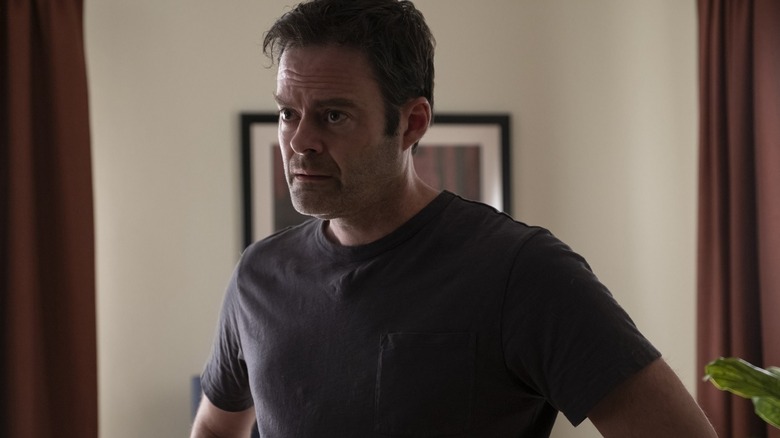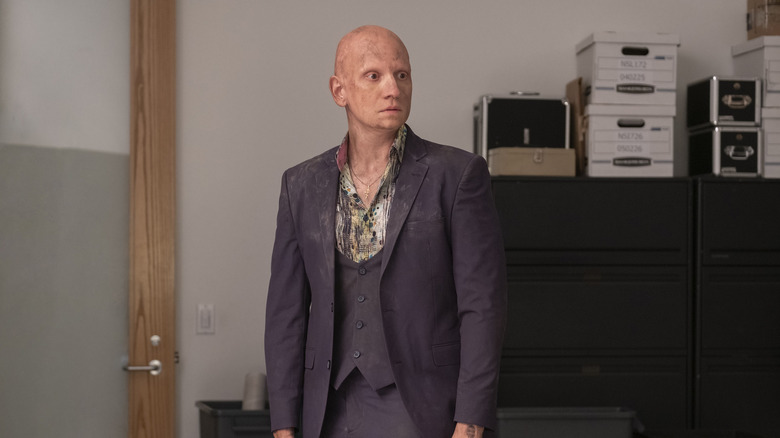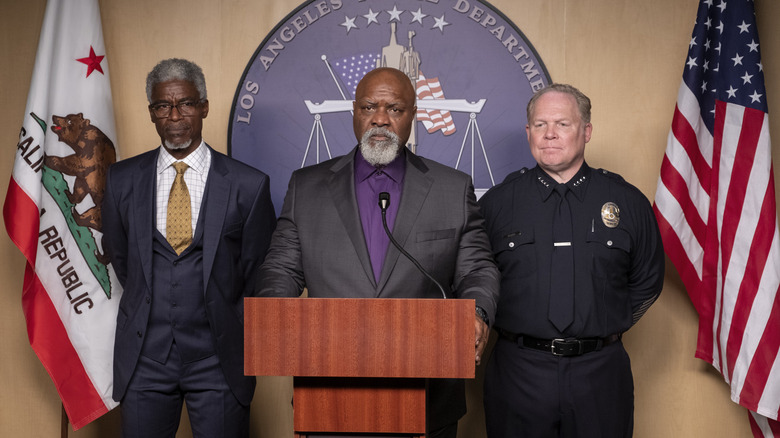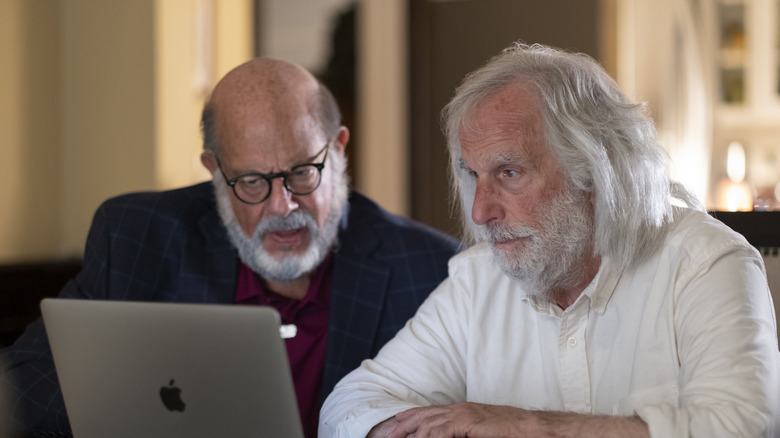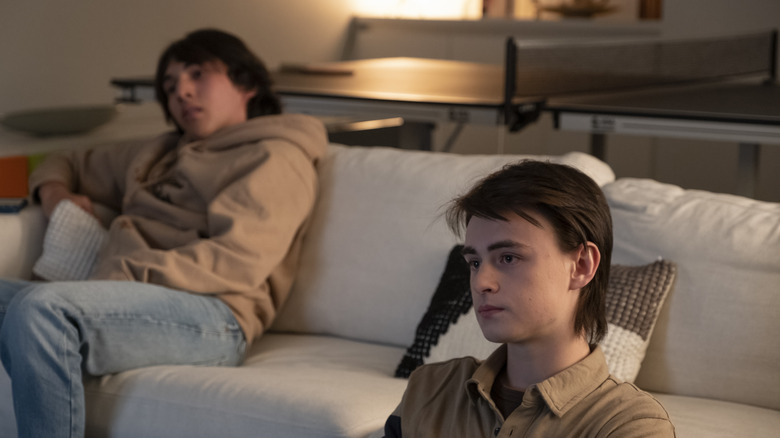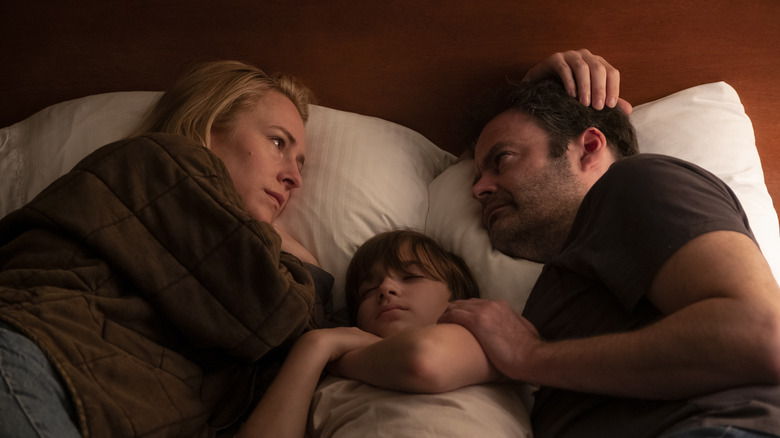Barry Season 4 Episode 8 Review: The Best Directed Show On TV Says Goodbye
OK, everyone, let's breathe. For some, there may be more no more compelling show on TV right now than the other big HBO series that wrapped up tonight, "Succession." But for many of us, the show in question is "Barry," the hybrid of dark comedy and suspense thriller that has leaned quite heavily on the latter part of that hybrid in its fourth and final season. Said season has now come to a close, and so now we're left with the pieces of what "Barry" left behind. (As the episode just wrapped, I encourage you to check out my post-mortem interview with the incomparable Stephen Root, who plays Monroe Fuches. I also warn you that spoilers lay within that interview and the rest of this review.)
In full transparency, I went into "wow," the finale of "Barry" with two questions on my mind: would Barry (Bill Hader) die, and would his son John (Zachary Golinger) survive? The previous episode gave us quite the cliffhanger: Barry had escaped the makeshift prison in the garage of Jim Moss (Robert Wisdom) to find that NoHo Hank (Anthony Carrigan) had abducted Sally (Sarah Goldberg) and John to make peace with Fuches and lure Barry to his almost certain doom. I don't want to say I had desperately desired Barry to die, but the character had made so many terrible choices, placed so many innocent lives in danger, and been so callous as to not ever take responsibility for his actions that life seemed too good for him. And his son, conversely, was as innocent as they come, and didn't deserve to die because of his father's misdeeds. And ... well, good news to me, because a) Barry does die and b) John does survive. But, of course, the details around each of those facts aren't simple.
We start with Fuches relaxing and having a nighttime bath before he's FaceTimed by Hank, who informs him of the above: that he's got Sally and John — the latter of whom Fuches didn't realize existed — and has already called Barry to get him to head over to NoHoBal headquarters. The presence of Sally doesn't do too much to raise Fuches' interest, but as soon as he sees John, a light bulb of some kind goes off, making him immediately spring into action and head over. (I wondered in advance of this episode if it might end in a cyclical manner, with John being mentored in a fashion by Fuches or someone like him, to be a new version of Barry. Could that be what Fuches had in mind?)
Barry, meanwhile, is headed back to the same big-box department store he stopped in two episodes ago, to the same weapons counter. And for what? "Guns," he all but shouts at the attendant before we cut (courtesy of Hader, who wrote and directed the finale) to a shot of Barry's back — he's stocked to the gills with rifles strapped to his back and doesn't even take care to take them off when he exits the store and gets in a car to drive to NoHoBal. (It is a perversely funny shot, in which none of the customers in the store bat an eye at the sight of Barry, and as he struggles to sit down in the driver's seat.)
In a dark place
I don't have a crystal ball when it comes to awards, but I do want to will this into existence: Sarah Goldberg needs to get another nomination for Best Supporting Actress at this year's Emmys, if not win the whole thing. She's had many, many great scenes this season, but it's hard to top the one she gets early in "wow." After Hank realizes he and Sally have a warped kinship when it comes to Barry — "You were in a dark place, and you thought he was the only one who could help you" — Sally tries to get a sense from Hank what might ... y'know, happen to her and John. "That's not for me to decide," Hank says balefully, which is not entirely true considering how he had his men abduct her, but whatever.
After he leaves, John starts asking perfectly logical questions that any kid would ask about his parents once he's gradually realized that he maybe doesn't know them at all. And soon enough, Sally comes clean, admitting that they don't move because of her "special job," but because she and Barry are fugitives, and that Barry wasn't just a soldier, but he was "a murderer." She even admits that she too is a murderer –—without noting that the murder she committed was in self-defense, whereas many of Barry's ... were not — and that "I deserve whatever happens to me ... but you don't." She breaks down, calling herself a bad mother even as John instantly runs to her and holds her tight. It's a hell of a scene, in no small part because it's one more time for Hader-as-director to deploy one of his favorite stylistic choices: a long, static take (this one's about 2 ½ minutes). It just gives Goldberg more time to slowly build and amplify her already remarkable performance.
Hank's men return then and take Sally out of the makeshift holding cell so that she can be presented by Hank to Fuches. Fuches, who arrives with his own group of men to match the men that Hank has flanking him, is not remotely interested in Sally. "Bring [the kid] out, or I walk," he states blankly and firmly. As Hank acquiesces, Fuches launches into a remarkable monologue, explaining that he has owned who he is — "a man with no heart" — but only after being tortured beyond belief in prison. Only then did he realize that all of his macho posturing was just that, and that he was never a true mentor (implying that Barry was just the latest in a long line of ex-military men he turned into cold-blooded killers). And to that end, Fuches decides on a dime to change the deal — he doesn't give a damn about Barry. What he does want is for NoHo Hank to come clean: to admit that all of his bloviating about how Cristobal helped build NoHoBal is bunk, and that Hank had the love of his life killed. And for a moment, the twist seems to work (right around the time John is brought out into the massive foyer of NoHoBal Industries): Hank breaks down in tears and says he "wanted to be safe," as Fuches nods in a disturbingly understanding fashion. "We all do," he says.
What God wants for Barry
But then ... well, it couldn't be that easy, could it? Hank tells Fuches to f*** off, that the deal is done, and then ... well, out come the guns. Right after we see Fuches whip out a massive, gold-plated gun and shoot NoHo Hank right in the heart, we get one more lengthy one-take from Hader-as-director: both groups of men fire at each other, with one fallen man eventually throwing a grenade on the opposite side of the foyer. Amazingly, Fuches — who deliberately covered John to the ground to ensure the boy wouldn't be hurt — survives, as does Sally. Fuches slowly brings John away from the carnage and outside the building; at the same time, Barry pulls up in the vehicle (far enough away to not know what's just transpired) and prays to the Lord to have the strength to sacrifice himself that night to ensure John can live a long life. But as soon as he exits his car (awkwardly again because of all the weapons on his back), he hears John calling to him and shares a silent, momentous last look with Fuches, who then runs off into the shadows for good. We get one final moment with Hank (as offscreen, we hear Sally meet up with Barry and John), as he lays dying at the foot of the statue of Cristobal; with one last ounce of strength, he puts his hand in the hand of his lover's (but not really his lover's), and that's it for our favorite Chechen.
That night, after Sally has reunited with Barry and John, the three of them all lay down in bed together, but Sally has a potentially concerning request for our title character: "You need to turn yourself in." You see, amid all the bloodshed and mob wars, we've briefly dropped in (during the first half) on Gene Cousineau (Henry Winkler), who has not yet been arrested for the death of Janice Moss, his detective girlfriend, but is surely about to be. (We see a snippet of a press conference in which Jim says he was manipulated by Gene, and that the acting teacher is the real puppet master who manipulated Barry into murdering Janice. I have to say: aside from Hader being very consistent throughout the series in portraying the cops as idiots, I feel like the way Jim Moss basically fumbled the football two yards from the goal line is a missed opportunity with this show. Jim, you had your daughter's killer in your garage! Tied up! You had him! Jim.) Gene is haunted and horrorstruck at the notion that he's going to go to jail because of his ego. If only he'd stayed away from Los Angeles, right?
Sally, after the carnage wrapped, has seen a headline about Gene's impending arrest, thus inspiring her request to Barry (and her admission that in the previous episode she'd visited Gene's house). "... I don't think that's what God wants for me," Barry says meekly, pointing out that he was ready to die at NoHoBal but was saved from having to put himself in harm's way, taking that as a sign. Though Sally drops the matter, it is more than evident before Barry goes to sleep that she's not really dropping the matter. It is, at least, evident to us. Not to Barry, who we then see wake up the next day to an empty bed and an empty room. Where could Sally be?
Oh wow
Well, Barry is convinced that Sally has headed back to Gene's, because that's just where his head's at. Gene's agent Tom (Fred Melamed) tries to get Gene — who's locked himself in his study and is reading more headlines about his impending doom — to buck up. This, in spite of the fact that Tom is ready to grab a suitcase and run far away; he can't, though, because Barry pushes his way in and is convinced that Sally and John are stashed away somewhere. (They clearly are not.) Tom is briefly able to reason with Barry, in a way that only Barry can be reasoned with, by framing the current moment as one where Barry can "save" Gene, who Tom notes is despondent because he's about to go to jail for someone else's crimes. Barry does seem convinced and willing to turn himself in, so he calms down.
And then Gene shoots him in the chest. (See, Gene had been toying with committing suicide with the gun we saw last season that he'd been gifted by the carousing actor Rip Torn.) "Oh wow," Barry says in shock ... right before Gene shoots him in the head.
... well then! There is some kind of perverse poetic justice for all of us in watching Gene's journey culminate in this way (and Barry's too) — we know, as does Gene, that Barry took Janice from Gene, and that Barry's attempts to wheedle his way back into Gene's life were self-serving at best. We know Gene was gutted by Janice's death. So his getting back at Barry does feel like an apt way to go.
The Mask Collector
But if you're an eagle-eyed viewer, you know that there's still about ten minutes left in "wow." What else could there be? Ah, it's time for an epilogue, which starts with the sound of applause, as we cut to a period later in the future: Sally is now a high-school theater teacher on the last night of a performance of Thornton Wilder's "Our Town," which goes over very well with the audience, including an older John (played by Hader's co-star in "It: Chapter Two," Jaeden Lieberher). Outside the show, it's a snowy night as Sally is greeted by an attractive older man who's a new teacher at the school; he compliments her on the performance and asks her out to coffee, and she just ... flatly, politely says no. Good for you, Sally. She, meanwhile, is headed back home with a bouquet of flowers in the passenger seat, but John is going to spend time at a friend's house.
Is he there to do something in secret? Oh yes. But it's nothing like doing drugs or playing violent video games. Instead, he's there to watch a movie called "The Mask Collector." And it becomes very clear to anyone watching that "The Mask Collector" is the movie version of ... well, the series we just saw. Yes, this is a movie all about Barry Berkman (now played by indie filmmaker/actor Jim Cummings) and Gene Cousineau (played by British actor Michael Cumpsty). Some of the broader points of the series will seem familiar, from the death of acting student Ryan Madison, to Gene and his budding romance with Janice, to Janice's death. That is, until it becomes clear in the film version, Gene killed Janice and coerced Barry into helping him hide the body. There's no Fuches parallel, no NoHo Hank, and the few glimpses of Barry's past we get are not as unflattering as the past we know he hid. Eventually — this movie-within-the-show takes up most of the last 5 minutes of the episode — we learn two things. First, Gene is serving life in prison for the deaths of both Janice and Barry; and second, Barry was buried in Arlington National Cemetery. As those words appear on screen, we cut back to John, who has something of a proud smile on his face.
And, my friends, that is "Barry." As I noted up top — walking into this episode, I dreaded a scenario in which John was killed and/or a scenario in which Barry lived. Now, you could argue that the latter of those scenarios does kind of come true. Yes, Barry dies, but the movie version of Barry that lives on is a wildly misleading lie. I'll be honest: while I thought most of "wow" did an excellent job of wrapping up the stories of these characters, the epilogue — as well as the throughline of what happens to our version of Gene, not the movie version — rings somewhat false. I have no problem buying that a movie studio would make a not-terribly-truthful version of the story of Gene and Barry, especially considering how Gene dispatches Barry in his house. I just continue to find it a little too hard to believe that Gene would be successfully thrown in jail for the murders of both Janice and Barry (especially Janice, seeing as he didn't, y'know, kill her).
Wrapping things up
See, there's one character I was curious to know if we'd see return this year, and the answer was no: Albert, Barry's old military pal. We saw Albert plenty last season as a now-hard-bitten FBI agent (and notably, presented as being much, much, much more intelligent than the LAPD) who is able to quickly see through a lot of Barry's lies. I realize that Albert forgave Barry for his sins because Barry saved his life, and enabled him to have a family back home. But it feels like a bridge too far to imagine he'd be okay with such a miscarriage of justice when he knows the truth. (And again: Jim Moss had Barry in his garage! I do not buy that he would think the comically goofy Gene Cousineau fooled him.)
There's also the potential significance of the last shot of "wow," as we see John seemingly soften a bit and smile. We know from the time jump that John had been much closer to his father than his mother, at least before the events of the final episode. But by not showing us even a single scene of John expressing concern or worry about his dad — Sally is right to run from Barry, of course, but we don't see the immediate fallout of that choice or their son's reaction — it's enough to wonder how John carried that image of his dad versus the man we knew. There are a few gaps there, and the implication of him being okay with this vision of his dad as captured on film. (It certainly seems like a vision that aligns with the lies Barry told John, but John should recall well enough to know that his dad didn't rescue him and his mother with guns blazing from mobsters working directly for Barry's acting teacher.)
I can't say that "Barry" wound up being quite as perfect in its conclusion as in its setup, but criticisms aside, this four-season journey has been a hell of an experience. Film buffs knew beforehand — if you know your Criterion Collection and Criterion Channel well — that Bill Hader was one of them. By the end of "Barry," it is clear that Hader has the potential to be one of the best filmmakers of his generation. I'm loathe to buy into the "This TV show is really just a 4-hour movie" line that some showrunners can pull (and that Hader has said). In this case, what I will say is this: "Barry" is arguably the best-directed show on TV, and we're all going to miss his distinctive eye now that it's over. Though this season may have had its bumps in the road, it featured some of the best performances on the small screen, one of the most effectively tense throughlines in modern TV, and a director whose own influences managed not to dominate the proceedings. Goodbye, "Barry." It's been quite the ride.
